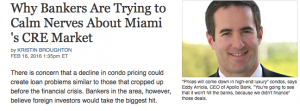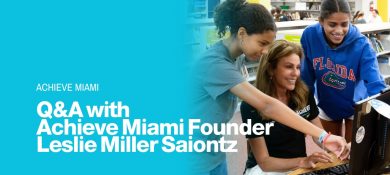By Kristin Broughton
February 16, 2016
Bankers, by and large, have been brushing off growing concerns from regulators about increasing risk lending against commercial real estate.
During quarterly conference calls, bank executives sought to calm skittish investors by pointing to strong demand for apartments, office towers and retail space across many markets.
Banks in Miami — one of the nation’s fastest-growing markets — have another factor working in their favor: a steady flow of investments from foreign buyers. Many projects, particularly high-end condos along the southern Florida coast, are actually being funded by foreign entities rather than U.S. banks.
While banks are missing out on those opportunities, they should also avoid exposure when prices on those condos inevitably drop, said Eddy Arriola, chief executive of Apollo Bank in Miami. About half of the $511 million-asset bank’s loans involve commercial and multifamily real estate.
“There will be a slowdown, and prices will come down in high-end luxury” condos, Arriola said. “You’re going to see that it won’t hit the banks, because we didn’t finance” those deals.
Arriola’s comments illustrate the regional factors at play into the commercial real estate boom, while revealing how many banks have taken precautions to limit their exposure to risky deals.
Regulators have recently raised red flags about potential excesses in the market, warning the banking industry about “substantial” loan growth, especially in multifamily buildings.
The warnings come as the luxury market shows signs of weakness. The median price of high-end condos in Miami fell nearly 10% in the fourth quarter from a year earlier, to $2.4 million, according to the real estate firm Douglas Elliman. At the same time, inventory increased.
Condo lending proved to be an Achilles’ heel for banks in the run-up to the financial crisis. Anumber of Florida banks, along with out-of-state lenders such as Regions Financial in Birmingham, Ala., took hits tied to condo loans, and Corus Bank in Chicago failed in 2009 shortly after issues surfaced in its South Florida condo book.
Arriola, along with other bankers, said he isn’t concerned about excessive risk-taking this time around.
“The regulatory guideline is basically like the U.S. surgeon general coming out and saying, ‘Look, you need to eat less sugar. You need to exercise more. You need to watch your weight,’ ” Arriola said.
Industry observers including Christopher McGratty at Keefe, Bruyette & Woods say a possible downturn in Miami’s luxury properties could take a bite out of banks that operate in the market.
For Arriola, the concern is that a correction in the condo market “will flow over to other areas,” though he said asset quality remains strong among Miami-area banks. Apollo, meanwhile, continues to finance airport hotels and other multifamily projects.
What distinguishes Miami from other booming markets is the steady demand for property among foreign buyers. That should continue as long as interest rates remain low and foreign exchange markets are volatile, Arriola said.
Recent data supports his observation. Foreign investment in commercial real estate has led to cases of “exponential price growth” in Miami, according to a recent report from the Federal Reserve Bank of Atlanta.
Foreign investors accounted for more than 30% of Miami’s real estate transactions last year, according to a report from the Miami Association of Realtors. Most buyers came from Latin American countries such as Brazil and Venezuela.
“This is still the safest place in the world to make” a real estate investment, Arriola said. Foreign investors want to “keep their second homes, establish a business here or keep money here, because they’d rather keep it in U.S. dollars.”
Apollo, formed five years ago when Arriola and an investment group bought the struggling Union Credit Bank, has ridden the wave of the city’s real estate boom since then. Since then, Apollo has more than doubled in size.
Arriola said he hopes to keep growing by turning the bank’s focus to acquisitions. Apollo most recently bought the $192 million-asset First Bank of Miami in Coral Gables.
The bank wants to do similar deals in the future, and is keen on buying some of the tiny banks based in southern Florida.
“We want to go to the prom,” Arriola said, referencing potential deals. “We have a tuxedo and a limo.”
In addition to running Apollo, Arriola chairs the Inter-American Foundation, a government agency that promotes diplomacy and provides development assistance in Latin America and the Caribbean. Arriola — an early supporter of President Obama — was appointed by the president and confirmed by the Senate in March 2012.
Arriola doesn’t get paid his work with the IAF, he said. While Apollo is expanding its correspondent banking business, Arriola’s role at the foundation doesn’t overlap with his work at the bank. Still, the post has given Arriola a firsthand look at the challenges facing investors in emerging markets throughout the region.
“I have a greater appreciation for what they do,” Arriola said.








 See More Blogs
See More Blogs
Comments